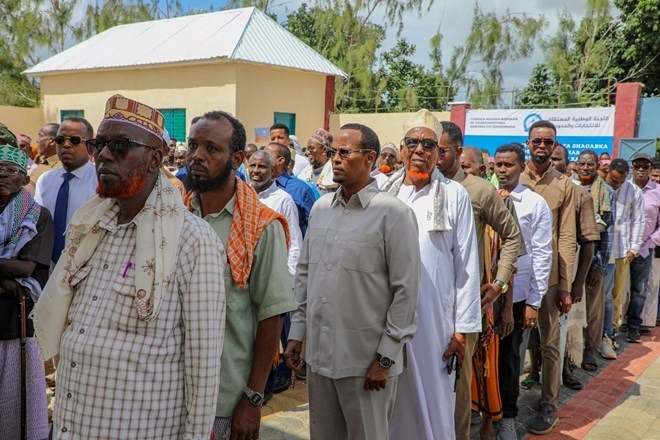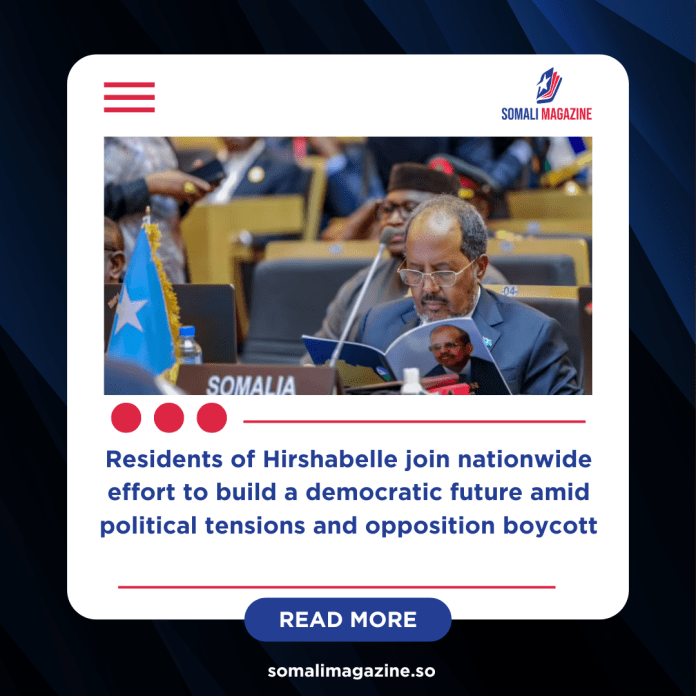Facebook Twitter (X) Instagram Somali Magazine - People's Magazine
Somalia’s journey toward a more democratic future took a major step forward on Sunday as the National Independent Electoral Commission began voter registration in Jowhar, the temporary capital of Hirshabelle State. This move is part of the country’s broader plan to adopt a “one-person-one-vote” electoral system, allowing citizens to directly choose their leaders.
From early morning, hundreds of residents gathered at voter registration centers across the city. Many expressed excitement and hope as they took part in what is seen as a historic moment for Somalia’s political development. For many, this is their first time participating in a national election process that values every individual vote equally.
Hirshabelle State President Ali Guudlawe encouraged all eligible residents to register and participate in the process. He was the first person in Jowhar to receive a voter card, officially launching the campaign in the state. Speaking after receiving his card, he called on citizens to play their role in building the country’s future through democratic participation.
The voter registration in Jowhar follows similar efforts already underway in other parts of Somalia. The initiative has been rolled out in the capital city, Mogadishu, as well as the South West and Galmudug states. According to the National Electoral Commission, registration will continue across all federal member states to make sure every eligible Somali has the opportunity to take part in the upcoming elections.
Officials say the goal of this campaign is to promote fair elections, strengthen democracy, and improve citizen involvement in the political process. The shift to a one-person-one-vote system is a major change from the previous clan-based power-sharing model, where elders selected lawmakers on behalf of their communities.

While the new system is being welcomed by many as a positive step toward stability and transparency, it has not come without challenges. Several key opposition leaders have criticized the process, accusing the federal government of moving forward without reaching a full agreement with all political parties. They argue that the government has ignored ongoing talks and concerns raised by opposition groups, and as a result, some leaders are boycotting the voter registration campaign.
Despite these political tensions, the National Electoral Commission remains committed to continuing the registration process. In a statement, the Commission emphasized the importance of nationwide participation and assured citizens that steps are being taken to ensure a transparent and inclusive electoral process.
The launch of voter registration in Jowhar is a significant moment for the people of Hirshabelle and Somalia as a whole. It shows progress in the country’s long journey toward establishing a functioning democracy. Many citizens say they are eager to finally have a direct say in who represents them, and they hope the upcoming elections will mark the beginning of a more peaceful and accountable government.
As Somalia continues to recover from decades of conflict and political instability, this move toward direct elections is seen as a vital part of rebuilding trust between the government and its people. The success of this process will depend not only on voter turnout but also on continued efforts to ensure fairness, security, and cooperation among all political stakeholders.
For now, the focus remains on getting as many people as possible registered to vote. In Jowhar and beyond, the hope is that this process will bring the country closer to a more democratic and united future.

